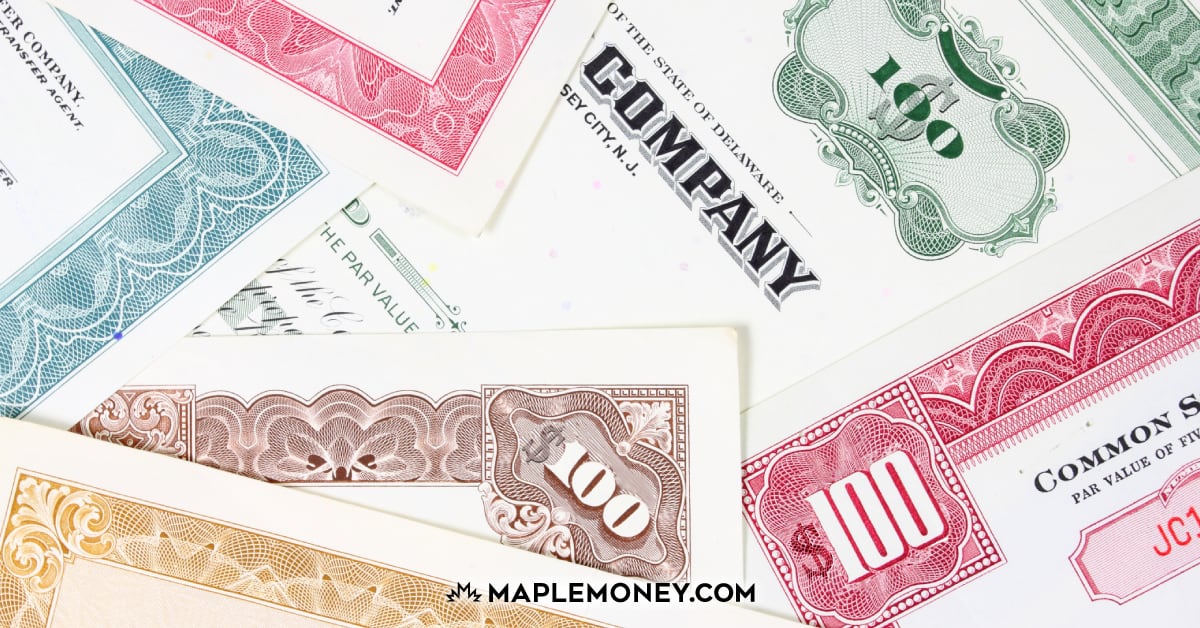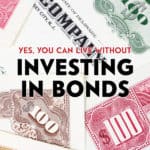Yes, You Can Live Without Bonds

The conventional view serves to protect us from the painful job of thinking.
~J.K. Galbraith
 A recent article in the Globe and Mail delivered the following advice to investors: Don’t Let a Fear of Bonds Infect Your Healthy Portfolio. The implications are clear:
A recent article in the Globe and Mail delivered the following advice to investors: Don’t Let a Fear of Bonds Infect Your Healthy Portfolio. The implications are clear:
1. Concerns about ultra-low interest rates eventually turning higher are overblown.
2. If you succumb to the paranoid people who think interest rates can actually rise above 0% – 3%, your portfolio will be unhealthy, damaged, infected. (The image with the article showed people in protective masks.)
3. And my personal favourite: Long term investors need not concern themselves with shorter term market movements because markets always rise over the long term – whenever that is.
So there you go. “Stop worrying so much about bonds.” All you have to do is put your desired allocation in bond mutual funds or ETFs for a long period of time and you’ll be good to go once retirement arrives. So says the analyst of one of the big 5 banks interviewed for this article.
But what if that doesn’t happen? What if all of those crazy people who think markets can move down as well as up, especially after a 30-year secular bull run, are right? What if owning bonds (rather than the fear of owning them) actually becomes the noxious agent in your portfolio? Well, if that happens, you’re bond funds will fall in price and the banks who run them will still have collected their fees from you for the entire period of time you owned them. Happy retirement.
Reasons to Stick With Bonds
Ok, so I’m being a little facetious. Let’s look at both sides of the debate. The bank analyst makes the following points:
- Bonds are a low volatility investment, meaning prices don’t swing as widely as they do for stocks.
- He looked at bonds over the past 61 years and found that “”the downside risk for them is contained.”
- “Now, with interest rates expected to rise when economic growth firms and inflation creeping into the economy from high oil and food prices, there’s growing concern that bonds are going to be a money-losing investment looking ahead. Maybe so. But getting rid of your bonds or bond funds is the wrong approach.”
- ‘“Bonds are an essential element of a diversified portfolio . . . You cannot live without bonds.”’
It’s true that bonds have historically acted as volatility stabilizers for investment portfolios, as they often rise in price (fall in yield) when stock prices fall. Still, the bond market has its own secular cycles and the reality is that it has been in a secular bull market for the last 30 years, aided and abetted over the past decade by monetary policy that has kept short term rates at or near the zero bound. How likely is it that this bull market will continue another 10 or more years?
I don’t know the answer to that, but neither does the bank analyst – or anyone else for that matter. What I do know is that secular bond bull markets can last for decades, but that they don’t go on forever. The laws of probability say that bond prices are more likely to stay the same or fall at some point over the next decade. Common sense says the same. After all, if rates are near zero, how much lower can they go?
Using 61 years of data to conclude that the downside risk for bonds is “contained” seems like the same logic Ben Bernanke and company used to tell us that the risks posed by subprime mortgages were contained because U.S. housing prices had never experienced annual declines before. That didn’t turn out so well.
It’s interesting that the analyst acknowledges that bonds could lose money, but that we must remain invested in them anyway. I’m not seeing the logic there. “You cannot live without bonds.” Really? I think I can.
The Bond Alternative
Regular readers already know what I’m going to say. I think GICs are a realistic alternative to bonds. (For American readers, GICs are the Canadian version of CDs.) In short, they provide the reduced volatility of bonds without the capital risk.
Given the fact that the bond bull is very long in the tooth (although I do think it will remain in place for a couple more years) I’m happy to be out of bonds, collect similar interest rates with 5-year GICs, and rest easy knowing that my capital is safe. I’m not saying you must do the same. It’s just a viable alternative that might appeal to some investors.
Note that if you still want to keep some of your portfolio in bonds, bond ETFs and mutual funds will fall in price if the bond market falls, but those declines can be somewhat mitigated as the manager rolls over maturing bonds and buys new, lower-priced issues. If you hold individual bonds (not that easy for individual investors) you’ll still collect your principal at maturity as long as the issuer doesn’t default. In that case, you don’t have to worry about falling bond prices.
Another alternative is to turn the possibility of increasing bond market volatility in your favour. If you have the knowledge and experience to trade, you can capitalize on market moves using regular and inverse bond ETFs. I don’t feel like I have the acumen to do that, so I opt for the GIC alternative instead.
Absolutes and pedantic pronouncements are dangerous both in investing and in life. Understanding the risk-reward proposition is essential to each decision. No one knows what will happen next in the markets, but each of us can make educated choices based on the probabilities as we see them and our own investment time frame. In the end, it’s your money and only you can take responsibility for the results of your investment decisions.
Do you think you can live without bonds?


Comments
Nice post Kim.
While I’m happy with my bond ETFs, you’re right for sure – GICs and other vehicles can work for investors as well. What risks, vehicles and objectives work for some people, might not work for others.
Personal finance and investing is after all, well, personal 🙂
Thanks Mark. There are lots of options for investors out there and no one size fits all solutions. Bonds are certainly one option, but are by no means the only one.
Count me in then as one of those outliers being OK to be without bonds (or at least very little into). Money market and other cash equivalents are working OK for me. I once tried an inverse bond ETF, but since I realized didn’t understand the mechanics of it all that well, I sold it and slept better.
Sleeping better is always a great investment premise! 😉
Thanks for your input!
I’m far from being an expert in bonds and I’m getting to the age where I’m supposed to move some of my portfolio into them. But, they don’t make any sense to me. First off, the yields on U.S. Treasury bonds is definitely below the true rate of inflation (despite what the government publishes), so they are guranteed to loose money. Second, the interest rates are definitely going to have to go up at some point, which will devalue bonds. Finally, a default on some bonds, including Treasuries, isn’t out of the questions. The yields on corporate bonds are more attractive, but the potential for rising interest rates presents a lot of risk. None of this adds up to an appealing investment to me.
It doesn’t add up to me either Bret. Once yields get this close to zero, it seems there’s only one way for them to go – eventually.
Thanks!
I invested in bonds in the 1990’s. You always read a lot about how a balance portfolio includes bonds.
However, I thought that they were more volitile than stocks, so got rid of them. The only one I kept was a 9.75% 30 years CIBC bond which I finanlly sold in 2007 at a good profit.
I have had no bonds since and only have stocks in my portfolio.
Susan
Wow. How I would love to buy something that yields 9.75%! It probably didn’t seem so great at the time, though. Still, good for you for collecting the coupon and the profit.
Thanks for stopping by! 🙂
You couldn’t be more right! The risk/reward of owning most bonds are insane for the long term. Except for a small postion in TIPS (Treasury Inflation Protected Securties) I hold NO bonds in the Arbor Asset Allocation Model Portfolio (AAAMP)(http://arborinvestmentplanner.com/performance.php). Personally I choose to put about 80% of what would be a bond allocation into cash and 20% into blue-chip dividend stocks. Short-term there is some yield sacrifice (very little) but leaves open the potential for growth and preserves capital for investment at higher rates in the future.
Hey thanks Ken. It’s great to see professional money managers thinking outside the box! 🙂
Except you can’t dump your GICs right away without penalty. Whereas you can with bonds.
I think most people confuse fixed income part of your portfolio with JUST bonds. There are other fix income products that work just as well, like preferred shares, debentures (ones sold on the stock market), reits, etc,. As well as GICs you’ve mentioned.
I’m not too fond of bond ETFs or mutual funds. I’d rather hold them directly and actually know the yield you’ll be getting. Funds don’t give you that option since their distributions vary due to the fact that they’re much more diverse in their holdings. People see this diversification as lower risk. However, if I were to actually hold a few good bonds, I’d get better returns at low risk levels, despite being less diverse. I don’t see the point of holding funds for diversification if all you want is yield.
THAT SAID, I personally don’t hold bonds directly. I live fine holding other fixed income products.
Some GICs are easier to liquidate than others – best to find out before you buy. I don’t intend to sell my GICs before they mature, but you never know what cards life may deal you ;). ING Direct offers at least some interest if you redeem early.
I must say I’m with you on bond funds. I just can’t make myself buy these things at today’s interest rates. Paying any amount in terms of MER seems to make them cost prohibitive – not to mention the capital risk. Frankly, I’d rather take my chances trading the markets.
Thanks for taking the time to comment!
For those that are reading this, yes there’s been a dip in the markets due to politics in the States. Yes, bond prices are up.
For those that bought bonds earlier and had the foresight, I salute you. You’ve made a killing in capital gains with bonds. And even if you only bought index bonds ETFs, in the week of this blog post, you’re up 2% at least.
For those that did make such a killing, I salute you as well! 🙂